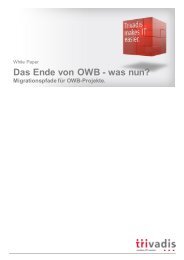phsjhxx
phsjhxx
phsjhxx
You also want an ePaper? Increase the reach of your titles
YUMPU automatically turns print PDFs into web optimized ePapers that Google loves.
2. Why are standards important<br />
For a machine executing a program, code formatting is of no importance. But for the human<br />
eye, well-formatted code is much easier to read. Modern tools can help to implement format<br />
and coding rules.<br />
Implementing formatting and coding standards has the following advantages for PL/SQL<br />
development:<br />
• Well formatted code is easier to read, analyze and maintain (not only for the author<br />
but also for other developers).<br />
• Developers do not have to think about where to search for something - it is already<br />
defined.<br />
• The developers do not have to think about how to name something - it is already<br />
defined.<br />
• The code has a structure that makes it easier to avoid making errors.<br />
• The code is more efficient with regards to performance and organization of the<br />
whole application.<br />
• The code is more modular and thus easier to use for other applications.<br />
This document only defines possible standards. These standards are not written in stone, but<br />
are meant as guidelines. If standards already exist, and they are different from those in this<br />
document, it makes no sense to change them.<br />
3. Naming Conventions<br />
3.1. General Guidelines<br />
1. Do not use names with a leading numeric character.<br />
2. Always choose meaningful and specific names.<br />
3. Avoid using abbreviations unless the full name is excessively long.<br />
4. Avoid long abbreviations. Abbreviations should be shorter than 5 characters.<br />
5. Any abbreviations must be widely known and accepted. Create a glossary with all<br />
accepted abbreviations.<br />
6. Do not use ORACLE reserved words as names. A list of ORACLE’s reserved words<br />
may be found in the dictionary view V$RESERVED_WORDS.<br />
7. Avoid adding redundant or meaningless prefixes and suffixes to identifiers.<br />
Example: CREATE TABLE EMP_TABLE.<br />
8. Always use one spoken language (e.g. English, German, French) for all objects in<br />
your application.<br />
9. Always use the same names for elements with the same meaning.<br />
PL/SQL Coding Guidelines 7




